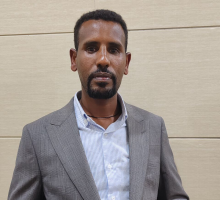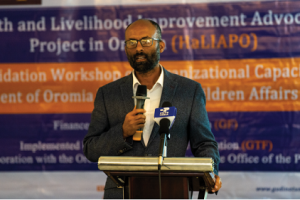
The housing demand alarmingly increased in Ethiopia in tandem with rapid population growth. Furthermore, the persistence of finance limitations and inadequate land accessibility, importing of construction inputs, and the like were serious factors that intensified the complexity of the issues. Therefore, officials and experts underlined that collaborative effort was required to address housing challenges.
Recently, the Ministry of Urban and Infrastructure (MoUI) and the Policy Studies Institute (PSI) organized a validation workshop on “National Housing Development Finance System Establishment” aimed at addressing housing challenges supported by research and private sector engagement.
At the workshop, Urban and Infrastructure State Minister, Helen Debebe, said that the government was striving to tackle housing challenges in collaboration with developers, housing financiers, land development and supplement institutes, urban planning, and experts, and so on.
“Establishing a national housing development finance system would help to address housing problems in regard to developing new houses, renovating old ones, ensuring economic fairness, and the like,” she said.
Presenting a paper at the event, Ethiopian Policy Studies Institute Researcher, Solomon Tilahun, said that Ethiopia is considered as one of the fastest urbanizing countries in Africa, with an annual growth rate of 4.7%.
Citing the World Bank’s 2019 report, Solomon expressed that the country required 471,000 housing units per year, with an additional total of 9.7 million units by 2037. In Addis Ababa, some 1,172,195 units, which represented one-third of the country’s projected housing demand, required over the next decade.
Solomon recommended that establishing mortgage banks and focusing government attention on the issue would play a pivotal role in reducing the bottlenecks of housing in Ethiopia, particularly in urban areas.
Habitat for Humanity Ethiopia (HFHE) Country Director and Organization Representative at the AU, Yitna Tekalign, told The Ethiopian Herald that his institute had been carrying out various activities in addressing housing, hygiene, sanitation, health, potable water, and energy challenges of the people since its inception.
According to him, HFHE was playing a significant role in the recently launched research in collaboration with the Policy Studies Institute (PSI) in finding alternative research in the housing sector. Therefore, HFHE was addressing over 850,000 people who lived in difficult situations across the country to bridge the huge gap between housing needs and resources.
“Currently, real estate housing is developing both in the metropolitan and the remaining parts of the country. Of course, it has its own role in housing, but such sectors are mainly focused on the affordability of the rich, including microfinance and banks,” he added.
Yitna underlined that 80% of the population could not afford to purchase houses. Therefore, it required other approaches like creating an enabling environment for private sectors to play a role in addressing the needs of low- and middle-income societies. Besides, conducting research regularly helped to address housing and related challenges in Ethiopia.
He pointed out that HFHE pledged to continue its effort in housing construction, infrastructure development, in cooperation with the government, private sector, research institutes, academia, and related bodies. It was also preparing a five-year national strategic plan to realize the accessibility of housing inclusively, sharing experiences from exemplary countries.
Speaking to local media, Goh Betoch Bank SC, Chief Operations Officer, Eskinder Dibekulu, on his part, said that there is a need for at least ten mortgage banks to address the housing problems in the country.
Eskinder recalled that there was a mortgage system in Ethiopia that played a decisive role in addressing housing challenges by providing various loan services. For instance, there are houses built in Addis Ababa, mainly around Alem Bank, Bole Medhanealem, and Saris Addisu Sefer areas, constructed by with a small interest mortgage loan of 4.5%.
“Though a lot of challenges are existing in the housing sector, the limitation of offering land, inadequate income, lack of housing construction materials, foreign exchange crunch, and lack of technology are serious factors that are hindering the realization of houses,” he added.
Likewise, the existence of high-interest loans and the limitation of housing project management were other serious challenges in Ethiopia. Therefore, exploiting housing development technology, construction input substitution, leading effective and efficient project management, establishing mortgage banks to provide low-interest loans, fundraising, and the like would assist in addressing such challenges in the housing issue, he advised.
Particularly, Ethiopia required sharing experiences from other countries to address the housing problem. For instance, Nigeria has a huge population in the African continent but small land compared with Ethiopia. However, the country provides house availability and affordability due to working cooperatively. Therefore, Ethiopia requires making an ecosystem that helps to address the housing challenges in a sustainable manner, Eskinder underlined.
BY MESERET BEHAILU
THE ETHIOPIAN HERALD SUNDAY EDITION 9 MARCH 2025




